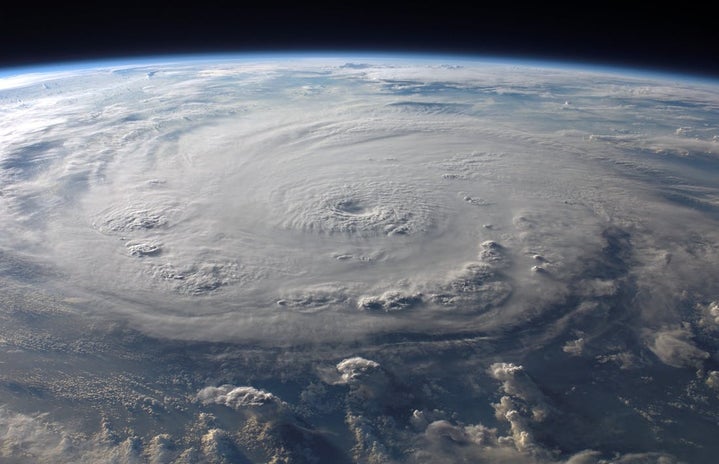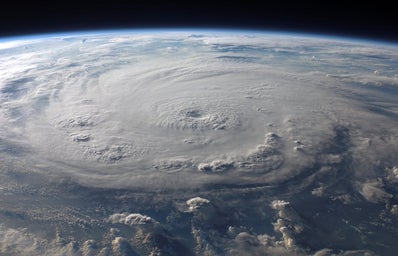Since 1851, when hurricanes first started being recorded, there have been 307 hurricanes in the Atlantic that have hit the US. The most deadly hurricane was the Galveston hurricane of 1900 with a total of 12,000 fatalities that can be attributed to poor technology and limited advanced notice. While some of the most historic hurricanes happened decades ago, hurricanes in the Atlantic are expected to become much stronger, more frequent, deadlier and leave behind costlier damages. These consequences can be attributed to a single man-made effect: climate change.
Though it might be difficult to connect a subtle rise of 1.3 ℃ in ocean temperatures and worse hurricanes, a slight change in the climate can ultimately have massive impacts on how our atmosphere interacts with the ocean. These interactions greatly impact people, especially those who call Florida home.
How Hurricanes Form
To better understand the impact of climate change on hurricanes, it is important to first understand the basics of how hurricanes form and in what conditions.
Hurricanes begin the same as any other storm: a cycle of evaporation and condensation that interacts with clouds to form storms. When this happens over warm water, it is known as a tropical disturbance. Barring interference from wind shear, land, dry air or cool water, the storm will continue to grow larger. As warm air moves upward, it releases heat, which causes an area of high pressure to form in the center of the storm. Air then moves to areas of low pressure causing winds to move in a faster circular motion, a key characteristic of hurricanes.
Hurricanes rely on heat and evaporation from ocean waters. These two processes have been greatly increased in recent decades by climate change and will continue to produce stronger and more threatening storms.
Climate Change and Hurricane Formation
It is no secret that temperatures have risen significantly in recent years. As temperatures rise in the atmosphere, most of the heat – as much as 90% – is trapped by the ocean water, specifically around the equator. This has a massive impact on how rapidly storms intensify and the level of intensity they are able to get to.
There is some debate about whether or not climate change is affecting the number of storms that form every hurricane season, but rising temperatures undoubtedly cause hurricanes to become stronger much quicker. While the most active decade for hurricanes was 30 years ago in the 1990s with over 30 named storms, the number of category 4 and 5 storms has nearly doubled since 1975.
The stronger the storm, the stronger the wind and the more rain it carries. This increase in strength has catastrophic effects on all kinds of communities, effects which are exacerbated by climate change.
Rising Sea Level
While rising sea level does not have any direct impact on the development or intensification of a hurricane, it does worsen the impact the hurricane will have at landfall.
While many coastal states are experiencing the effects of sea level rise, Florida is one of the most affected states. Florida also happens to be the state that is impacted most frequently by hurricanes with 40.4% of all US hurricanes impacting Florida. While sea level rise thus far only causes slight flooding at high tide in coastal cities, these effects are worsened if these areas are impacted by hurricanes. If water levels are already high enough to be encroaching on daily life, when a storm hits and brings multiple feet of storm surge with it, floods become more widespread and more catastrophic.
Sea level rise also puts stress on water drainage systems making it difficult for flooding to resolve. Even more, regular flooding due to a rise in sea levels can cause dunes and beaches to erode. Beyond destroying treasured beaches and important ecosystems, this makes the shoreline even more vulnerable to storm surge. With less beach and dunes, there is less to prevent water from rushing in, allowing more to flood an area and more quickly.
Coral Reefs
It is well understood that climate change has contributed to the destruction of many coral reefs around the world. Higher temperatures cause coral bleaching and infectious disease to become more common in reefs. Coral reefs have also experienced a lot of destruction due to rising carbon dioxide levels in the atmosphere from human activities. Reefs play a vital role in protecting coastlines from storm surge and strong storms, so their destruction should be prevented.
While coral reefs may not seem like a great barrier to hurricanes – after all they are under water. However, they actually can dissipate as much as 97% of energy in waves, reducing storm surge. Climate change can impact the severity of hurricanes through more than just rising temperatures.
If we continue to do nothing to prevent and potentially reverse the effects of climate change, then these trends will only worsen. The worse climate change becomes, the worse the storm surge will be, more destruction is caused, more people have their livelihood ruined and more human life is lost. It is imperative that we pay attention to climate change and make small efforts every day to counteract them.


